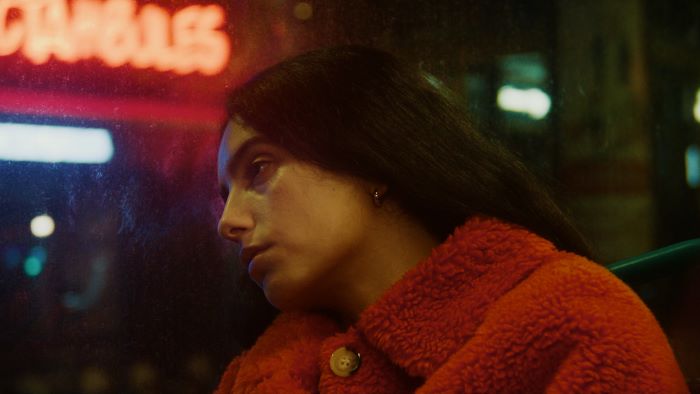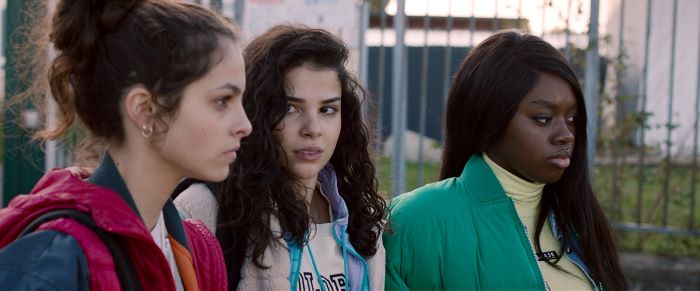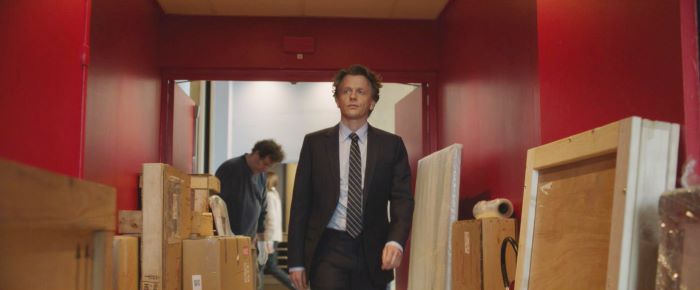
Louise Mauroy-Panzani, left, and Ilça Moreno Zego in Àma Gloria (Sebastien Fouque/Film at Lincoln Center)
It’s difficult to find a film festival as consistent as Film at Lincoln Center and Unifrance’s Rendez-Vous with French Cinema, a ten-day event that brings together some of the best and most exciting contemporary French films, including many that currently lack American distribution. Most of the 21 films on this year’s lineup rely on stories that center around the various ways we connect with others—through relationships, through love, or even through sheer luck. While their narrative and stylistic structures may be completely different, these four films all fall under this thematic underpinning.
Àma Gloria
Marie Amachoukeli’s layered Àma Gloria examines the relationship between a young White child and her Black nanny to deliver subtle yet powerful messages about childhood ignorance and innocence. The bite-sized, 84-minute film starts out simply. When six-year-old Cléo’s nanny and predominant mother figure, Gloria (Ilça Moreno Zego), returns to her native country of Cape Verde to take care of her biological children, Cléo (Louise Mauroy-Panzani) struggles to get by in her absence. Hoping to remedy the situation, Cléo’s father arranges for his daughter to visit Gloria during her summer vacation (for which he compensates Gloria). While there, Cléo quietly (and sometimes loudly) observes Gloria’s life, culture, and familial relationships, constantly discovering more about a person she thought she already knew. This journey of discovery is balanced with the increasing tension of Gloria’s attempts to take care of Cléo and her own children.
Àma Gloria’s fragile story is smartly refracted through Amachoukeli’s use of different perspectives. For most of the film, we adopt Cléo’s point of view as she interprets all of Gloria’s actions as any child would—confusing, incomprehensible, and frustrating. Through our positions as viewers, as well as the everyday conversations Gloria has with others that Cléo observes, we inherently align with Gloria’s perspective as well, understanding both sides yet comprehending that, because of Cléo’s age, social position and cultural disposition, there’s so much she cannot, and perhaps will not, understand. These complex ideas are brilliantly rendered by the script and its strong performances. Both Mauroy-Panzani and Moreno Zego deliver emotionally shattering portrayals that perfectly render the two’s deceptively simple, yet incredibly complex relationship.
The Rapture
Romantic connection is at the forefront of Iris Kaltenbäck’s The Rapture, with a dangerous twist. Lydia (Hafsia Herzi), a lonely midwife, is recovering from an intense breakup with her boyfriend and dealing with newfound loneliness, especially as her best friend, Salomé (Nina Meurisse), has become a mother. After Lydia meets Milos (Alexis Manenti), a late-night bus driver, the two spend a loving, intimate night together, only for Milos to be uninterested in taking things any further. Months later, while caring for Salomé’s baby, Lydia runs into Milos. Hoping to spend more time with him, she tricks Milos into believing that the baby is theirs. The lie works. But, as Lydia and Milos’s relationship grows stronger, the falsehoods understandably become more complex and more dangerous.
Kaltenbäck’s film boasts a simple structure and a single plotline. Nearly every scene furthers the complexity of Lydia’s lie, an element that works both for the film and against it. The rapidity at which the stakes increase—with Lydia taking more drastic steps to tie up loose ends—creates a deeply entertaining, extremely uncomfortable experience from start to finish. That being said, the film’s commitment to exploring one storyline often renders certain moments repetitive, feeling too similar to other films featuring unreliable protagonists. Additionally, the overuse of voice-over, funneled through Milos’s perspective, provides an interesting break from Lydia’s command of the story, but lacks sufficient development.
Sisterhood
The initial plot of Nora El Hourch’s Sisterhood centers around the strong connection between teenaged best friends Amina (Léah Aubert), Djeneba (Médina Diarra), and Zineb (Salma Takaline). Matters quickly take a turn when the three capture a video of Zineb being sexually harassed by one of the neighborhood’s shadier figures and a close friend of her brother. The three fight over whether to post the video or not, and eventually, without her friends’ consent, Amina posts it onto a social media account she creates. The post’s quick, exponentially expanding virality drives a stake between Amina’s relationship with Djeneba and Zineb, especially due to their different races and class statuses.
El Hourch’s immediately captures the intensity of the friends’ relationship before the video is taken–using quick-paced dialogue, rapid-fire text messages, and their strong mutual affection for one another. The differences between each teen begin to make themselves clear alongside the increase in tension, making the film consistently entertaining, rewarding, and thought provoking. Sisterhood often struggles to balance all its themes, though, leading to underdeveloped ideas and slightly frustrating plot breaks. However, the film is at its strongest when it explores the racial and social differences that give the girls different kinds of freedom, and ignorance.
Auction
The newest film by master screenwriter Pascal Bonitzer (Benedetta, The Innocents) also explores the idea of connection, though perhaps not in the same way as the first two films. Here, the relationships are between mostly estranged collaborators. An art appraiser (Alex Lutz) strikes gold when he discovers a long-lost Egon Schiele painting belonging to a working-class family in the French countryside. To finalize the painting’s sale, valued at eight digits, he collaborates with his ex-wife (Léa Drucker) and races to get the painting prepped for auction. All the while, he struggles to maintain a consistent working relationship with his assistant/coworker/intern (Louise Chevillotte), who has a hard time avoiding her addiction to compulsive lying.
Like so many contemporary films from acclaimed screenwriters, Auction falls in the paradoxical middle ground of being too ambitious yet not ambitious enough, of feeling too complex for its own good, yet too barebones to make a lasting impact. Certain plotlines—especially the ones following supporting characters, such as the intern—feel misplaced. And yet, because Bonitzer’s fast-paced screenplay is so precise and humorously dry, the film still manages to work as an entertaining, 91-minute tonic and a sly caper. Sometimes, just watching eccentric characters interact in extremely specific ways is entertaining enough.









Leave A Comment